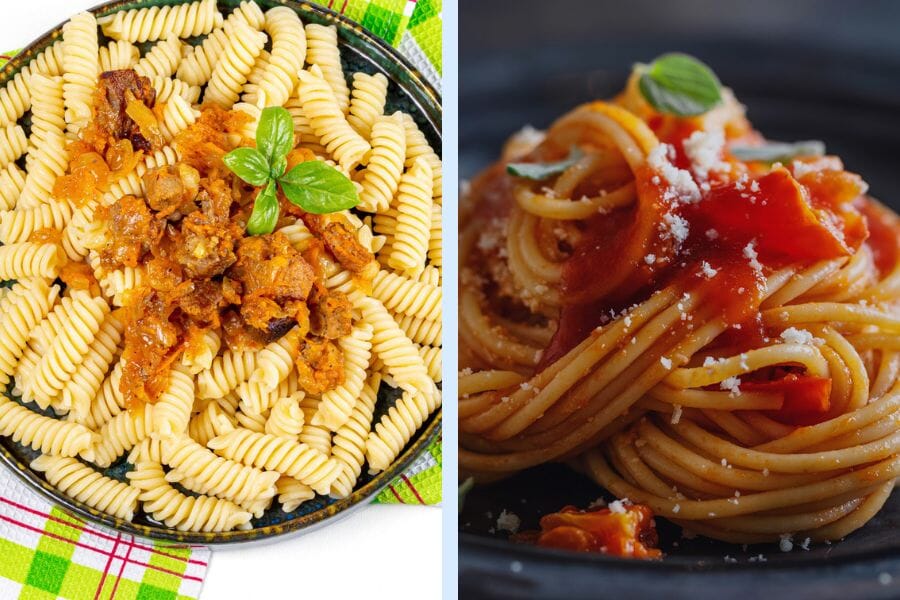Italian pasta is celebrated for its simplicity. It is typically crafted from durum wheat semolina and often enriched with high-protein burrata cheese, eggs, and additional cheese for richness in certain regional variations. In contrast, American pasta embraces flexibility, incorporating flours like all-purpose or enriched varieties for a softer texture.
Additionally, While American pasta may not match the diversity of Italian shapes, it offers a range of classic options, from spaghetti to macaroni, catering to a broad spectrum of culinary creations. In this blog, we’ll explore the difference between Italian Pasta and American Pasta. So, without further ado, let’s delve into it.
Explore The Differences Between Italian And American Pastas With Burrata Cheese
Burrata cheese adds a luxurious touch, seamlessly blending with both culinary traditions, creating a dining experience at the best Italian restaurants in Los Angeles that celebrates the unique characteristics of each pasta style.
Italian Pasta
Ingredients
Italian pasta takes pride in simplicity. It is often made from durum wheat semolina, filled with high protein and contributes to its signature firmness and burrata cheese. Some regional variations may be reflected in eggs and cheese for added richness.
Production
Italian pasta making involves a precise process. Firstly, the dough is formed, kneaded and then rolled into various shapes. The entire expertise lies in the hands of culinary masters who ensure the perfect texture and taste.
Drying Process
Italian pastas are traditionally air-dried as compared to American pastas. The slow drying process ensures it cooks to perfection.
Variety
There are an array of delicious pasta shapes. The variety reflects the regional touch and Italian culinary traditions, from the iconic spaghetti to the intricate orecchiette. Plus, you can get a variety of Italian pasta at the best Italian restaurants in Los Angeles.
American Pasta
Ingredients
You can often incorporate various flours in American pasta, including all-purpose or enriched varieties. This flexibility caters to different preferences and contributes to a softer texture.
Production
The production of American pasta emphasizes convenience. These pasta are designed for easy preparation, making it accessible to a wide audience.
Drying Process
American Pastas are dried in large-scale commercial facilities using forced air compared to Italian pastas. This drying process eases mass production and quick distribution in the local market to cater to its overwhelming demand.
Variety
American Pasta may not match the diversity of shapes found in Italian pasta, but it offers you a range of classic options. From spaghetti recipes and macaroni to beyond, American pastas cater to a broad range of culinary creations.
Wrapping Up
Lastly, if you’re looking to savor these delectable recipes at the best Italian restaurant in Los Angeles, choose Burrata House.
Frequently Asked Questions
Q1: Is Italian Pasta Healthier Than American Pasta?
A1: The healthiness of Italian pasta compared to American pasta is subjective and depends on factors like ingredients, preparation methods, and personal dietary preferences.
Q2: Why Is Italian Pasta Healthier?
A2: Italian pasta is often considered healthier due to the emphasis on high-quality ingredients such as durum wheat semolina, higher protein content, and traditional production methods. The incorporation of ingredients like burrata cheese and eggs adds nutritional richness, contributing to the perception of Italian pasta being a healthier option.
Q3: Can you find Italian pasta shapes in American markets?
A3: Yes, many Italian pasta shapes are widely available in American markets, allowing consumers to explore and enjoy the diversity offered by traditional Italian pasta.
Q4: How do the ingredients differ between Italian and American pasta?
A4: Italian pasta commonly uses durum wheat semolina, providing a higher protein content. American pasta, on the other hand, may incorporate various flours like all-purpose or enriched varieties, impacting the texture and nutritional composition.

